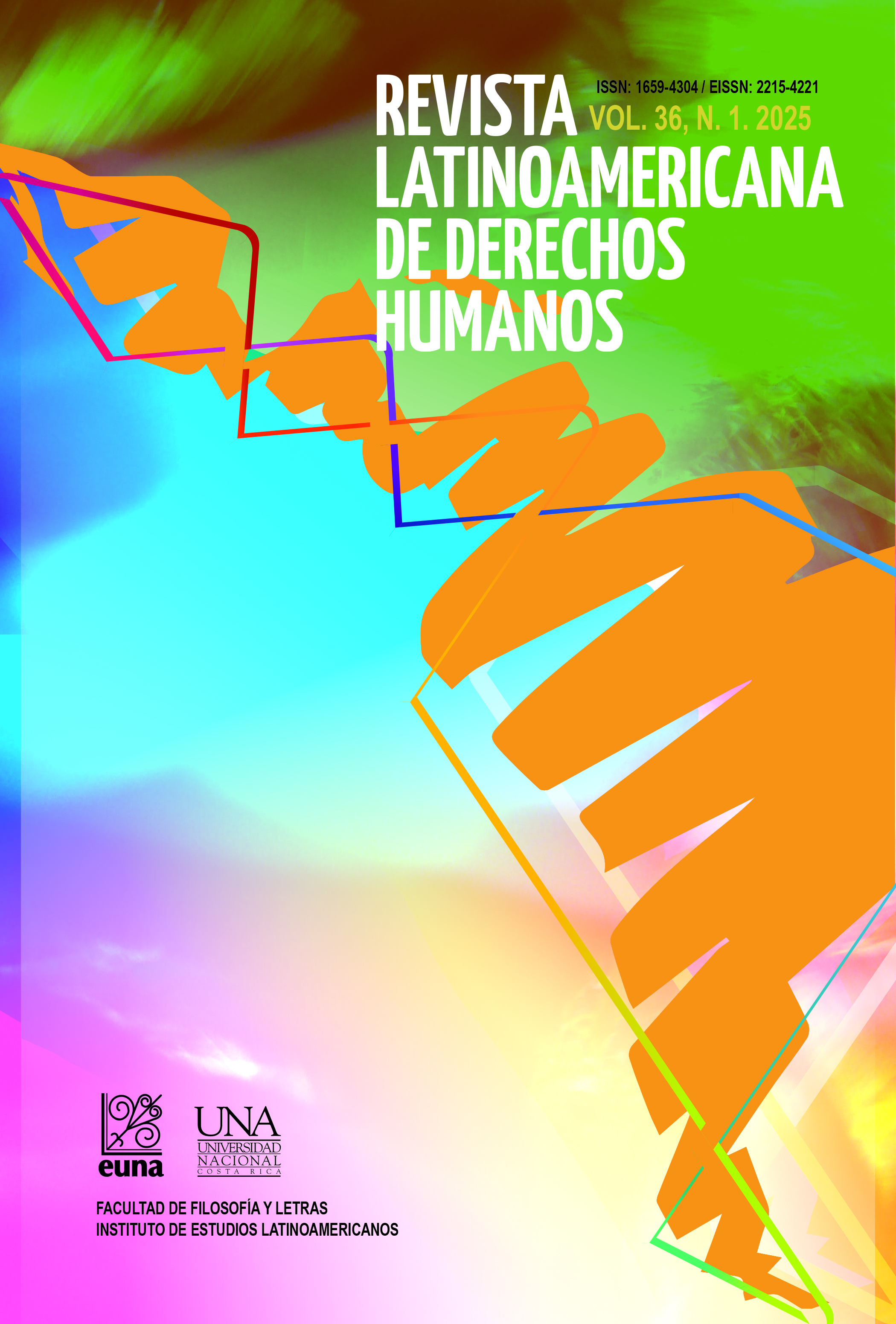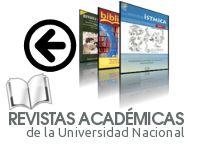The Hacker Perspective in Human Rights Education within Digital Culture
DOI:
https://doi.org/10.15359/rldh.36-1.4Keywords:
educational technology, human rights, citizenship education, media literacyAbstract
This article presents a participatory and activist action-research project conducted in Brazil by the Federal Universities of Santa Catarina and Bahia, in collaboration with public schools. The systematized and researched experience offers a thoughtful reflection on the integration of Information and Communication Technologies (ICT) in human rights education, presenting it as both a challenge and an opportunity for new possibilities. The proposal merges hacker education with human rights education. The hacker education paradigm emphasizes the value of autonomy, agency, empowerment, authorship, and collective, collaborative production in an openness of sources and know ledges with, for, and through ICT. This paradigm intersects with the human rights education paradigm, particularly in its promotion of the acceptance of otherness and its commitment to democratic coexistence, plurality, and intercultural education. Based on a project carried out between 2018 and 2022 with basic education teachers, this research aimed to analyze the challenges and opportunities presented by the hacker perspective in human rights education in the digital age. The university-school action is analyzed through the collective understanding of the project's participants and presents principles to guide public policies, teacher education, and educational research, including the importance of research on the margins, the role of public intellectuals, the dismantling of the subject-object distinction, the promotion of non-hierarchical relationships between universities and schools, and the recognition of teachers as researchers.
References
Aguado, A. G. (2020). Educació Hacker i Empoderament: de les comunitats hacker fins a l'escola. [Tesis doctoral, Universidad Autónoma de Barcelona]. https://aguado.cc/publicacoes/
Aguado, A. G. & Canovas, I. A. (2021). Cultura hacker e educação: Percepções dos hackers sobre a vivência de elementos de sua cultura nas escolas. Perspectiva, 39(3), 1-18. https://doi.org/10.5007/2175-795X.2021.e81052
Antunes, D. C.; Zuin, A. S. (2008). Do bullying ao preconceito: os desafios da barbárie à educação. Rev. Psicol. Soc. v. 20, n.1. https://doi.org/10.1590/S0102-71822008000100004
Aragão, C. A. (2023). Educação política na escola: o caminho do monitoramento participativo mediado pela tecnologia cívica digital. [Tesis doctoral, Universidade Federal da Bahia]. www.repositorio.ufba.br
Benkler, Y. (2006). The wealth of networks: how social production transforms markets and freedom. Harvard Journal of Law & Technology. v. 20, n. 1. Yale University Press.
Bonilla, M. H., & Pretto, N. (2015). Movimentos colaborativos, tecnologias digitais e educação. Em Aberto, 28(94).
Castells, M. (2012). Redes de indignación y esperanza. Alianza Editorial.
Cohen, L., Manion, L., & Morrison, K. (2017). Research Methods in Education (8th ed.). Taylor & Francis. https://doi.org/10.4324/9781315456539
Coelho, I. C. (2020). Não é mimimi. Proposta de educação intercultural em direitos humanos na cultura digital. [Tesis doctoral, Universidade Federal de Santa Catarina]. https://repositorio.ufsc.br/handle/123456789/215888
Dahlgren, P. (2009). Media and political engagement: Citizens, communication and democracy. Cambridge University Press.
Dahlgren, P. (2004.). Civic cultures and net activism: modest hopes for the EU public sphere. Conference on One EU - Many Publics? University of Stirling.
Escaño, C. (2018). Educación hacker: Una pedagogía crítica (inter) creativa para los comunes del conocimiento. En La otra educación. Pedagogías críticas para el siglo XXI (pp. 53-64). Universidad Nacional de Educación a Distancia, UNED.
Feenberg, A. (2002). Transforming Technology: A Critical Theory Revisited. Oxford University Press. https://doi.org/10.1093/oso/9780195146158.001.0001
Ferreira, K. (2022). Educação colaborativa para democracia: experiências sociológicas no ensino remoto. [Tesis de maestria, Universidade Federal de Santa Catarina]. https://repositorio.ufsc.br/handle/123456789/244103
Fortunati, L. (2014). Media Between Power and Empowerment; Can we resolve the dilemma? The Information Society, 30, 169-183. https://doi.org/10.1080/01972243.2014.896676
García-Canclini, N. (2006). Hybrid cultures, oblique powers. Media and Cultural Studies, 73, 422.
Himanen, P. (2001). La ética del hacker y el espíritu de la era de la información. Booklet.
Keen, A. (2007). The cult of the amateur: how today's internet is killing our culture. Doubleday/ Currency.
Kellner, D. (1989). Critical theory, Marxism, and modernity. Johns Hopkins University Press. https://doi.org/10.56021/9780801839139
Kirwan, B. & Ainsworth, L. K. (2005). A guide to task analysis. Taylor & Francis.
Lacerda, A. L. (2020). Formação do sujeito-arquiautor em práticas de empoderamento na escola por meio de audiovisualidades da cultura digital. [Tesis doctoral, Universidade Federal de Santa Catarina]. https://repositorio.ufsc.br/handle/123456789/216438
Lapa, A. (2013). Reflexões sobre a formação crítica em redes sociais. Bergmann, J.; Grané, M. (Ed.). La universidad en la nube (pp. 23-46). Universitat de Barcelona: Laboratori de Mitjans Interactius.
Lapa, A., Lanna, L. C., & Silva, S. S. (2019). Desafios da Pesquisa Ativista em Educação. Revista Teias, 20, 7-21. https://doi.org/10.12957/teias.2019.43336
Lapa, A., Bartolomé Pina, A., Menou, M. (2019). Empoderamento e educação na cultura digital. Revista Educação e Cultura Contemporânea, 16(43), 419-438. http://dx.doi.org/10.5935/2238-1279.20190020
Lapa, A., Pretto, N., Coelho, I. C., Aguado, A. (2022). Educación hacker en derechos humanos: propuestas para la formación crítica. En C. G. Grimalt-Álvaro, J. Holgado, L. Marqués, R. Palau, C. Valls, C. Hernández-Escolano (Eds.). Llibre d’actes FIET2021: La investigació i la innovació en Tecnología Educativa a l’era digital (pp. 106-119). Publicacions URV. https://llibres.urv.cat/index.php/purv/catalog/book/486
Lapa, A., & Colucci, I. (2021). Escola e internet: Espaços de formação para cidadania. Perspectiva, 39(3), Article 3. https://doi.org/10.5007/2175-795X.2021.e72019
Levy, S. (1994). Hackers: Heroes of the Computer Revolution. New York, NY, USA: Dell Pub.
Machado, A. (2002). Arte e Mídia: Aproximações e distinções. Galáxia. Revista do Programa de Pós-Graduação em Comunicação e Semiótica, 4, Article 4.
Martín-Barbero, J. (2002). La educación desde la comunicación. Editorial Norma.
Menezes, K. M. (2018). Pirâmide da pedagogia hacker=[vivências do (in) possível] [Tesis doctoral, Universidade Federal da Bahia].
Pinheiro, D. S. (2022). Itinerância autoral docente para criacao de materiais didáticos: tensionamentos e potencialidades em tempos de cibercultura. [Tesis doctoral, Universidade Federal da Bahia]. www.repositorio.ufba.br
Pretto, N. D. L. (2017). Educações, Culturas e Hackers: Escritos e reflexões. EDUFBA. https://doi.org/10.7476/9788523220198
Pretto, N.L., Lapa, A., Coelho, I. C. (2021). Educação hacker: espaço de possibilidade de formação crítica na pandemia. En L. Dias & R. Silveira (Eds.), Redes, sociedades e territórios (pp. 150-177). EDUNISC, 2021, p. 150-177. https://www.unisc.br/pt/home/editora/e-books?id_livro=506.
Pretto, N. D. L., Lapa, A., & Bartolomé Pina, A. (2022). Espíritu hacker: empoderando ciudadanos digitales. Edutec, Revista Electrónica de Tecnología Educativa (82), 1-8. https://doi.org/10.21556/edutec.2022.82.2743
Rakos, F. M. (2021). Educação em Direitos Humanos e Conexão Escola Mundo: desafios e oportunidades no processo de empoderamento juvenil. [Tesis de maestría, Universidade Federal de Santa Catarina]. https://repositorio.ufsc.br/handle/123456789/211362
Raymond, E. S. (2004). The Jargon File. http://catb.org/jargon/
Rheigold, H. (1993). The virtual community. Addison-Wesley.
Ritta, S. B. (2021). Elas que lutam: diálogos entre ciberfeminismo e a educação escolar como prática para liberdade. [Tesis de maestría, Universidade Federal de Santa Catarina]. https://repositorio.ufsc.br/handle/123456789/229070
Rüdiger, F. (2011). As teorias da cibercultura: perspectivas, questões e autores. Sulina.
Santos, M. (2000). Por uma outra globalização: do pensamento único à consciência universal. Record.
Shirky, C. (2011). A Cultura da Participação: Criatividade e generosidade no mundo conectado. Editora Zahar.
Turkle, S. (2011). Alone together. Basic Books.
Zuboff, S. (2019). Un capitalismo de vigilancia: sua escova de dentes te espiona. Le Monde diplomatique em português, pp. 30 32.
Zuboff, S. (2015). Big other: Surveillance capitalism and the prospects of an information civilization. Journal of Information Technology, 30(1), pp. 75-89. https://doi.org/10.1057/jit.2015.5
Published
How to Cite
Issue
Section
License
El material que se publica en esta Revista está bajo una licencia “Creative Commons” 3.0 Costa Rica (CC, Reconocimiento-NoComercial-SinObraDerivada 3.0 Costa Rica (CC BY-NC-ND 3.0 CR) . Esto significa que el material publicado en la revista se puede compartir (copiar y distribuir) en cualquier medio o formato considerando que se debe reconocer de forma adecuada la autoría del material y la fuente, no puede utilizarse con fines comerciales y no se aceptan las obras derivadas (remezclar, transformar o crear a partir del material).








